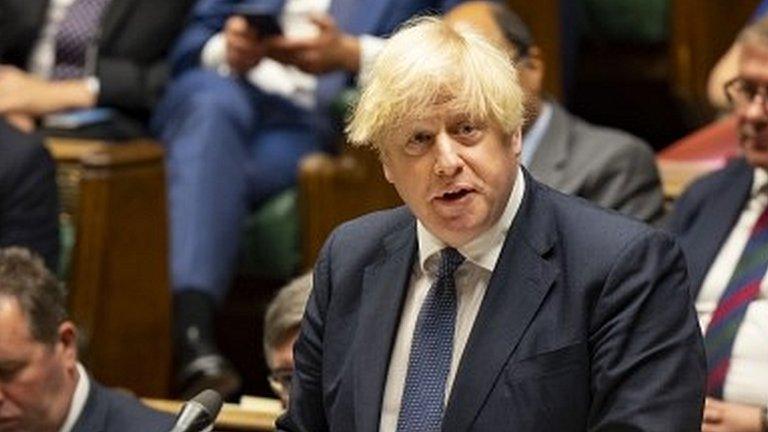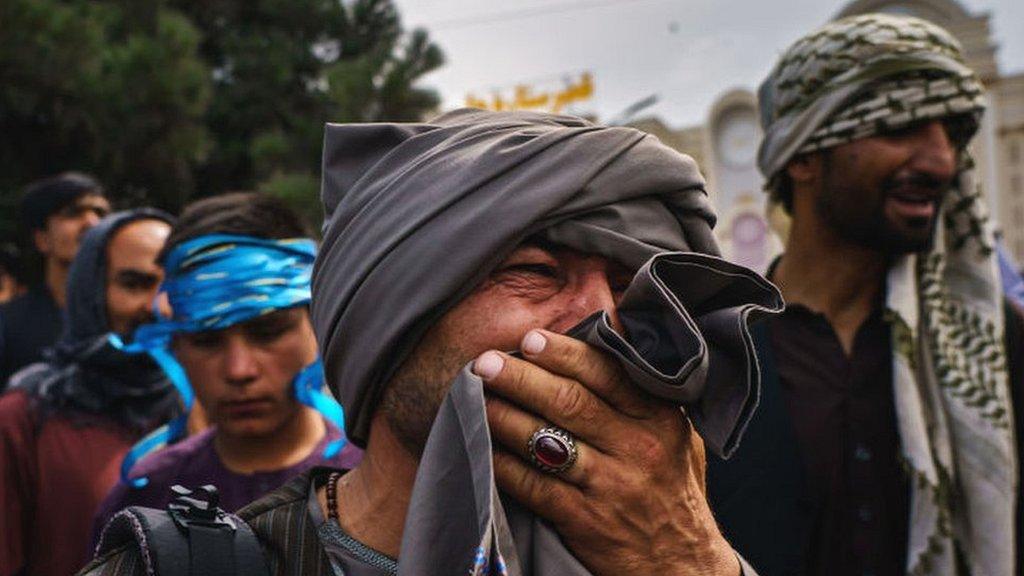Foreign secretary Dominic Raab rejects calls to quit over Afghan interpreters
- Published
The foreign secretary gives a one word answer when asked about his future.
Foreign Secretary Dominic Raab has rejected calls to quit after claims he should have personally intervened to help evacuate Afghan interpreters.
Mr Raab was advised to phone his Afghan counterpart for urgent support - but it's understood the job was given to a junior minister.
Opposition parties say this was an error of judgement that put interpreters' lives at risk.
Asked in Downing Street if he would resign, Mr Raab replied: "No".
Earlier this week, newspaper reports suggested, external the foreign secretary was seen relaxing on a beach on the Greek island of Crete on Sunday - the day Taliban militants entered Kabul, Afghanistan's capital.
Mr Raab said that while he was away he had been directing his team and engaging with international partners.
As originally reported by the Daily Mail, external, Mr Raab was advised by senior Foreign Office officials on Friday he should make contact with Afghan Foreign Minister Hanif Atmar to get urgent assistance in rescuing Afghan interpreters who had worked for the British military.
Officials said it was important the call was made by him rather than a junior minister - but they were told Mr Raab was unavailable.
Labour's shadow foreign secretary Lisa Nandy said: "How can Boris Johnson allow the foreign secretary to continue in his role after yet another catastrophic failure of judgement?
"If Dominic Raab doesn't have the decency to resign, the prime minister must show a shred of leadership and sack him."
SNP Westminster leader Ian Blackford said Mr Raab had made "a massive error of judgement". He tweeted, external: "His position is completely untenable and he must resign, or be sacked."
Liberal Democrat leader Sir Ed Davey also said on Twitter: "Raab must go, external".
But Health Secretary Sajid Javid said his cabinet colleague was "one of the most professional and most effective ministers I've ever worked with".
He added: "Instead of playing games, people should focus on the issue at hand which is what can we be doing as a country, as a government to support those people in Afghanistan whether they are British nationals or Afghan refugees."

Ministers, like many of us, go on holiday in August.
But this is both a further illustration of the extent to which the government had little idea how fast things were changing in Afghanistan and, perhaps, that some in the Foreign Office are less than impressed with Mr Raab's focus, or lack of it, on the job -- and so decided to tell the Daily Mail about it.
Defence Secretary Ben Wallace has suggested that phone call wouldn't have made any difference, given the Afghan government was crumbling.
But if the speed of its crumbling - and the takeover by the Taliban - was known within government last Friday, why was the foreign secretary still on holiday, as a huge plank of UK foreign policy was disintegrating?

Defence Secretary Ben Wallace told BBC Breakfast "the only thing that mattered" last Friday was whether Kabul airport would continue to allow people to get out.
"No amount of phone calls to an Afghan government at that time would have made any difference," he added.
Responding to a report in the Times, external that the permanent secretaries - the top civil servants - at the Home Office, Foreign Office and Ministry of Defence are currently on holiday, a government spokesperson said that "departments across Whitehall have been working intensively" on the situation in Afghanistan.
The BBC has been told that the civil servants in question are continuing to work while on holiday, and that the Ministry of Defence and Home Office have two permanent secretaries each, which ensures one is at work when the other is on leave.
The Foreign Office has a designated acting permanent secretary to cover periods of leave.
An Afghan refugee, who has resettled in Glasgow, feared he would be "tortured and beheaded" by the Taliban for working as an interpreter for the British army
MPs on all sides criticised the government's response to events in Afghanistan in the House of Commons on Wednesday.
On Wednesday night, Mr Raab said he had spoken to the US Secretary of State Antony Blinken to discuss both countries' response to the situation in Afghanistan.

WHAT DOES THE FUTURE HOLD FOR ORDINARY AFGHANS?: The Return of the Taliban
WHAT'S THE TALIBAN'S END GAME?: A BBC News Special on the ongoing situation in Afghanistan

Related topics
- Published18 August 2021

- Published15 August 2023
